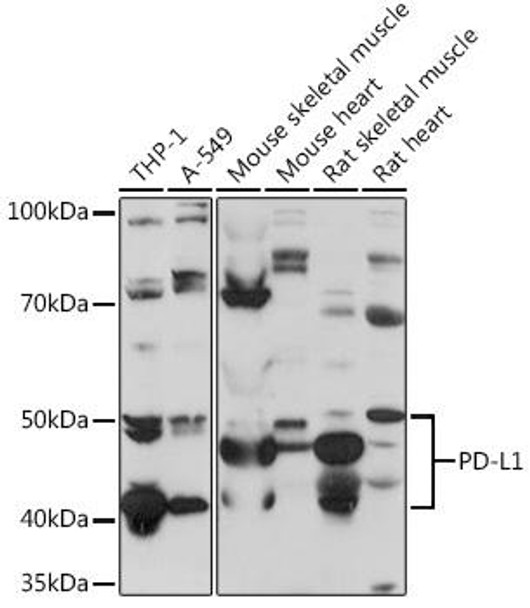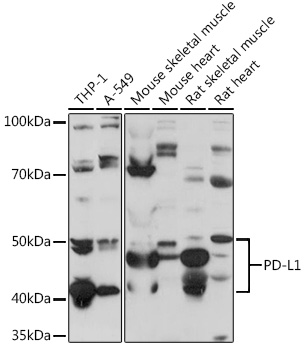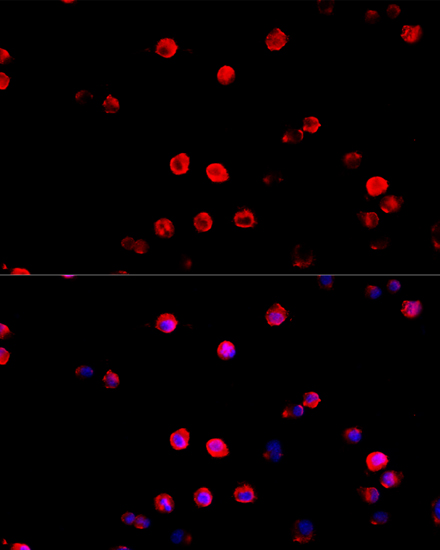Anti-PD-L1 Antibody (CAB1645)
- SKU:
- CAB1645
- Product type:
- Antibody
- Reactivity:
- Human
- Reactivity:
- Mouse
- Reactivity:
- Rat
- Host Species:
- Rabbit
- Isotype:
- IgG
- Antibody Type:
- Polyclonal Antibody
- Research Area:
- Immunology
Frequently bought together:
Description
| 抗体名: | Anti-PD-L1 Antibody |
| 抗体コード: | CAB1645 |
| 抗体サイズ: | 20uL, 50uL, 100uL |
| 申し込み: | WB IHC IF |
| 反応性: | Human, Mouse, Rat |
| 宿主種: | Rabbit |
| 免疫原: | Recombinant fusion protein containing a sequence corresponding to amino acids 19-238 of human PD-L1 (NP_054862.1). |
| 申し込み: | WB IHC IF |
| 推奨希釈: | WB 1:500 - 1:2000 IHC 1:50 - 1:200 IF 1:50 - 1:200 |
| 反応性: | Human, Mouse, Rat |
| ポジティブサンプル: | THP-1, A-549, Mouse skeletal muscle, Mouse heart, Rat skeletal muscle, Rat heart |
| 免疫原: | Recombinant fusion protein containing a sequence corresponding to amino acids 19-238 of human PD-L1 (NP_054862.1). |
| 精製方法: | Affinity purification |
| ストレージバッファ: | Store at -20'C. Avoid freeze / thaw cycles. Buffer: PBS with 0.02% sodium azide, 50% glycerol, pH7.3. |
| アイソタイプ: | IgG |
| 順序: | FTVT VPKD LYVV EYGS NMTI ECKF PVEK QLDL AALI VYWE MEDK NIIQ FVHG EEDL KVQH SSYR QRAR LLKD QLSL GNAA LQIT DVKL QDAG VYRC MISY GGAD YKRI TVKV NAPY NKIN QRIL VVDP VTSE HELT CQAE GYPK AEVI WTSS DHQV LSGK TTTT NSKR EEKL FNVT STLR INTT TNEI FYCT FRRL DPEE NHTA ELVI PELP LAHP PNER |
| 遺伝子ID: | 29126 |
| Uniprot: | Q9NZQ7 |
| セルラーロケーション: | Cell membrane, Endomembrane system, Single-pass type I membrane protein |
| 計算された分子量: | 20kDa/33kDa |
| 観察された分子量: | 40-50KDa |
| 同義語: | B7-H, B7H1, PDL1, PD-L1, PDCD1L1, PDCD1LG1, CD274 |
| バックグラウンド: | This gene encodes an immune inhibitory receptor ligand that is expressed by hematopoietic and non-hematopoietic cells, such as T cells and B cells and various types of tumor cells. The encoded protein is a type I transmembrane protein that has immunoglobulin V-like and C-like domains. Interaction of this ligand with its receptor inhibits T-cell activation and cytokine production. During infection or inflammation of normal tissue, this interaction is important for preventing autoimmunity by maintaining homeostasis of the immune response. In tumor microenvironments, this interaction provides an immune escape for tumor cells through cytotoxic T-cell inactivation. Expression of this gene in tumor cells is considered to be prognostic in many types of human malignancies, including colon cancer and renal cell carcinoma. Alternative splicing results in multiple transcript variants. |
| UniProt Protein Function: | CD274: Involved in the costimulatory signal, essential for T- cell proliferation and production of IL10 and IFNG, in an IL2- dependent and a PDCD1-independent manner. Interaction with PDCD1 inhibits T-cell proliferation and cytokine production. Belongs to the immunoglobulin superfamily. BTN/MOG family. 3 isoforms of the human protein are produced by alternative splicing. |
| UniProt Protein Details: | Protein type:Membrane protein, integral Chromosomal Location of Human Ortholog: 9p24.1 Cellular Component: plasma membrane Molecular Function:protein binding Biological Process: cell surface receptor linked signal transduction; immune response; negative regulation of activated T cell proliferation; negative regulation of interferon-gamma production; negative regulation of interleukin-10 production; positive regulation of T cell proliferation; regulation of activated T cell proliferation; response to cytokine stimulus; signal transduction; T cell costimulation |
| NCBI Summary: | This gene encodes an immune inhibitory receptor ligand that is expressed by hematopoietic and non-hematopoietic cells, such as T cells and B cells and various types of tumor cells. The encoded protein is a type I transmembrane protein that has immunoglobulin V-like and C-like domains. Interaction of this ligand with its receptor inhibits T-cell activation and cytokine production. During infection or inflammation of normal tissue, this interaction is important for preventing autoimmunity by maintaining homeostasis of the immune response. In tumor microenvironments, this interaction provides an immune escape for tumor cells through cytotoxic T-cell inactivation. Expression of this gene in tumor cells is considered to be prognostic in many types of human malignancies, including colon cancer and renal cell carcinoma. Alternative splicing results in multiple transcript variants. [provided by RefSeq, Sep 2015] |
| UniProt Code: | Q9NZQ7 |
| NCBI GenInfo Identifier: | 83287884 |
| NCBI Gene ID: | 29126 |
| NCBI Accession: | Q9NZQ7.1 |
| UniProt Secondary Accession: | Q9NZQ7,Q14CJ2, Q2V8D5, Q66RK1, Q6WEX4, Q9NUZ5, B2RBA2 B4DU27, |
| UniProt Related Accession: | Q9NZQ7 |
| Molecular Weight: | 20,454 Da |
| NCBI Full Name: | Programmed cell death 1 ligand 1 |
| NCBI Synonym Full Names: | CD274 molecule |
| NCBI Official Symbol: | CD274 |
| NCBI Official Synonym Symbols: | B7-H; B7H1; PDL1; PD-L1; PDCD1L1; PDCD1LG1 |
| NCBI Protein Information: | programmed cell death 1 ligand 1 |
| UniProt Protein Name: | Programmed cell death 1 ligand 1 |
| UniProt Synonym Protein Names: | B7 homolog 1; B7-H1; CD_antigen: CD274 |
| UniProt Gene Name: | CD274 |
View AllClose



